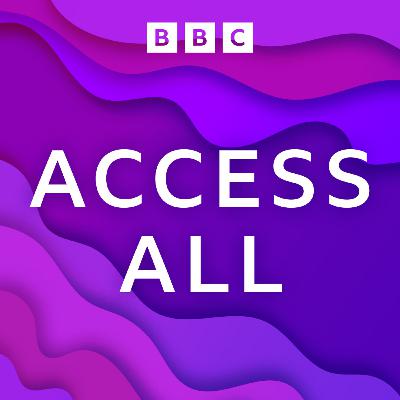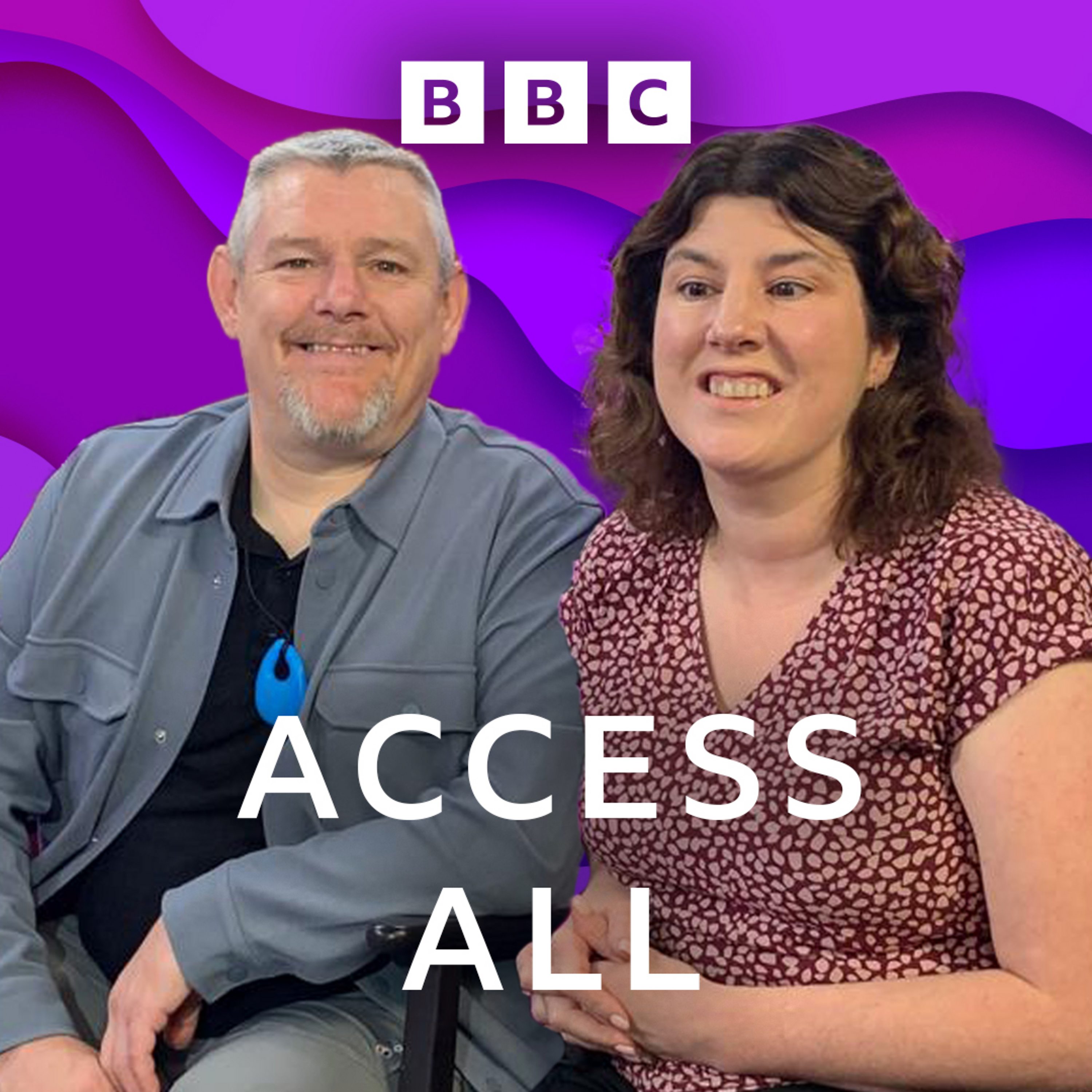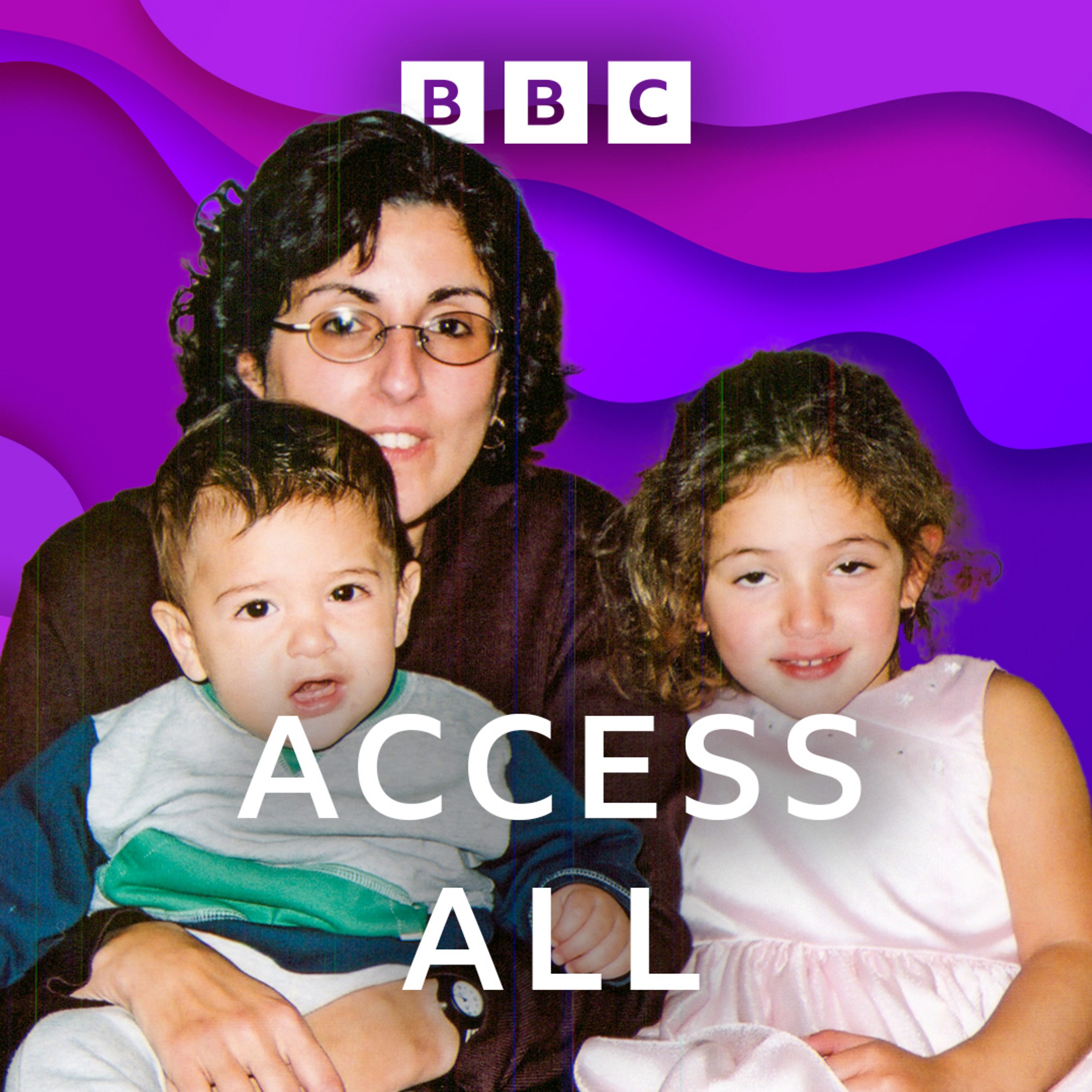Discover Access All: Disability News and Mental Health
Access All: Disability News and Mental Health

634 Episodes
Reverse
In our pick of the year's best interviews on Access All, we look back at a year of perceptive interviews by Emma Tracey with great people and their great thoughts on living this disabled life. We hear from author of The Vulpine, Polly Crosby, who has cystic fibrosis and tells us she writes "little and often" so she can write comfortably with the condition she has. Comedian Chris McCausland now feels he can talk openly about being blind after the emotional experience of winning Strictly Come Dancing. And comedian Harriet Dyer who is always really open about mental illness tells us about the night she nearly died twice - though it had nothing to do with what was going on in her head. There's even more than that, and each have their own great insights that we recommend wholeheartedly as a Christmas uplift. Yours sincerely, the Access All team Presenter: Emma Tracey
Mixed by: Dave O'Neill
Produced by Alex Collins
Editor: Damon Rose
Do you know anything about disability beyond your own? We test three well-known disabled people.
Featuring BBC Chief North America Correspondent Gary O'Donoghue, Coronation Street's Jack Carrroll and writer-comedian Juliette Burton. In this poignant parody game, blind, cerebral palsy and mental health are respectively their HOME impairments so will our brave contestants choose to answer questions about their HOME condition, or go AWAY and get more points for answering a question correctly about someone else's.
Hosted by Emma Tracey who is consciously embracing this medical-sounding game to see what emerges. Listen, laugh and learn in the most self-aware episode of the year.
email accessall@bbc.co.uk
Mixed by: Dave O'Neill
Produced by: Damon Rose, Alex Collins, Emma Tracey
Series Producer: Beth Rose
Editor: Damon Rose
Say to your smart speaker: "Ask BBC Sounds for Access All" and the latest edition will play immediately. Subscribe to Access All on BBC Sounds or wherever you get your podcasts.
When Crystal Palace play Manchester City on 14 December, Neale Ormston will become the first visually impaired commentator of a premier league football match. That's thanks to a new headset which has allowed him to see games in detail for the first time in years. He’s nervous and excited to join Crystal Palace’s specialist commentary team and wants more clubs to buy into the GiveVision headsets which have revolutionised his match-day experience.It's Disability History Month and the Disability Law Service (DLS), which gives free legal advice on everything from housing to employment, has just marked its 50th birthday. It started in 1975 - the same year Jaws hit the cinema. Andrew MacKay, its CEO and a lawyer himself, remembers some of the cases DLS is most proud of, talks about his team - 90% of whom are disabled - and reveals how he manages his ADHD alongside a law career. And Mat Fraser, a successful actor, musician and activist with short arms, is on the show to talk about a brand new arts project. Mat was a big figure on rights marches and crip cabarets in the 1990s and explains how you can contribute to Disability Arts Online's new archive project, Cripping Culture, which has received £250,000 in funding to make sure no disability culture memories are lost. He also talks about his recent double hip replacement and how he's already got back to picking up teacups with his toes...Presented by Emma Tracey
Sound mixed by Dave O'Neill
Produced by Emma Tracey and Alex Collins
Series producer is Beth Rose
Editor is Damon Rose
It's 3 December, the International Day of Persons with Disabilities (IDPD). While everyone chooses to mark it differently - from focusing on leveling up work places, to reminding people to be more inclusive - we've decided to celebrate with some big names from the disability world!Dr Shani Dhanda speaks to us from Tokyo where she's delivering a keynote speech at the world's first Accountability Summit which has brought together 500 companies who made disability pledges in the past two years to see just how well they're doing. Plus she reveals how she would ideally celebrate IDPD CEO of Paralympics GB, Dave Clarke, tells us what he thinks about marking the day and reveals the latest research about the number of disabled people getting involved in sport and what's holding others back.Plus, we have Hollywood film star, presenter and campaigner, Adam Pearson, in the house. He's just been announced as the patron of Face Equality International. He talks about the challenges AI can pose for someone with a facial difference and gives us the inside scoop on his next big film role....a man he once loathed as a child, but has come full circle to love.Intrigued? - Get your party hat on and take a listen!Presented by Emma Tracey
Sound mixed by Dave O'Neill
Produced by Emma Tracey and Alex Collins
Series producer is Beth Rose
Editor is Damon Rose
The Autumn Budget was pronounced today and, as expected, it came with some changes to VAT exemptions on higher-end Motability cars and the types available. Emma Vogelmann from Transport for All gives us the charity's reaction.It's the BBC's Scam Safe week and, as Trading Standards reveal that neurodivergent people are 50% more likely to fall for a scam, we speak with cybersecurity expert Holly Foxcroft, about why the figures are so high. Holly is autistic and lives with "thriving ADHD".Former BBC editor Mark Mardell made headlines a few weeks ago when Turkish Airlines refused to let him fly without a doctor's note, owing to his Parkinson's. Mark has an update on what he's planning to do next to stop anyone else experiencing what he went through.Presented by Emma Tracey with Hayley ClarkeSound mixed by Dave O'NeillSeries producer is Beth RoseEditor is Damon Rose
We pay tribute to US writer and community-builder Alice Wong who died this week at 51. Known for her Disability Visibility project and #CripTheVote, we hear from her friend Nichola Griffith who collaborated with her on a writing project called #CripLit. She never actualy met her offline yet they made a big connection. If you didn't know of her in life, here's your chance for her to inspire you with the spirit she created.Journalist Alex Taylor fell foul of a TikTok prank when someone stuck out their tongue at him to get a reaction. He then chased them in his powerchair to try and delete the video before it got online. He believes he was targeted because he was disabled.Also, presenter Emma Tracey shoots the breeze about gyms, exercise and talks to award-winning podcaster Grace Gigi Ogun, who makes the funny rich audio podcast Journeys With Grace about living with kidney cancer, and has a talent for football and music. Presenter/producer Emma Tracey, mixed by Dave O'Neill, produced by Kevin Satizabal Carrascal, Alex Collins, series producer Beth Rose, editor Damon Rose.
Email: accessall@bbc.co.uk with your thoughts and questions. And say "Ask the BBC for Access All" to your smart speaker and subscribe to us on BBC Sounds. We're here every week.
Comedian and author Cariad Lloyd says her "heart exploded" when she was invited to take part in her latest TV project, Playtime.The show sees neurodivergent comedians work alongside students who receive SEND support to come up with a play and perform it. Joining the conversation is Playtime’s autistic director, Céin McGillicuddy, who explains the joy of making the programme in just one day.Emily and Olivia are sisters who run Wheely Good Ceramics. They tell Access All how they have worked together to create a successful business - Olivia throws and sculpts the products while Emily mouth paints the designs.Comedian, TV star and disability consultant, Simon Minty, joins Emma in the studio throughout.Presented by Emma Tracey with Simon Minty
Sound mixed by Dave O'Neill
Produced by Emma Tracey and Alex Collins
Series producer is Beth Rose
Editor is Lisa Baxter
After a summer of discontent and rebellions around welfare reform, the government has announced how it will look into the future of Personal Independence Payments (Pip) with the Timms Review, named after the Government minister in charge.
That Minister is Sir Stephen Timms and he joins Emma to reveal who will be working with him on the review and how you can get involved. He also admits delays with Access to Work are getting worse, not better.
Natasha Bloor had no idea she would be making headlines when she decided to train as a hairdresser. But the deaf stylist who communicates in British Sign Language (BSL) has become quite the hit, with deaf people from around the world flying in and booking their appointments with her so they can relax and chat while in the salon.
Disabled influencer Eliza Rain, aka Disabled Eliza, also joins Emma Tracey in the studio to chat about what she does, and rolling, not running, the London Marathon.
Presented by Emma Tracey
Sound mixed by Dave O'Neill
Produced by Emma Tracey and Alex Collins
Series producer is Beth Rose
Editor is Damon Rose
There have been lots of rumours and speculation around Motability recently, especially when it comes to eligibility and price rises. The scheme enables some disabled people to lease and adapt vehicles using an element of their Personal Independence Payments. We get myth-busting with the CEO of the Motability Foundation, Nigel Fletcher, to find out what's really going on.And buildings around the world will turn purple next week as part of Purple Tuesday - an initiative to improve the consumer experience for disabled people. Founder of the event, Mike Adams, reveals it's reached countries including Pakistan and Malaysia and has inspired companies to pledge commitments including the six-second rule...Presented by Emma Tracey and Paul CarterSound mixed by Dave O'NeillProduced by Emma Tracey and Alex CollinsSeries producer is Beth Rose and this episode's editor was Lisa Baxter
The first driverless taxis are coming to London in 2026 courtesy of Google's sister company, Waymo. They'll be on trial in the capital, but will they become an access wonder or woe?Emma Tracey and Paul Carter quiz Amanda Ventura from Waymo on all the ins and outs on what the new vehicles could mean for disabled people. We also speak to American tech journalist, Steve Aquino, who as a man with anxiety and a visual impairment loves using them to get out and about. And we find out if Emma Vogelmann, the co-CEO of Transport for All, and a powerchair user, would take one for a spin.Plus, our very own producer Amy Elizabeth is in the studio because she has just won Carer of the Year! As well as juggling a career as a journalist, Amy decided to move in with her grandmother, Helen, who has been living with dementia for 10 years.Produced by Alex Collins, Kevin Satizabal Carrascal and Amy ElizabethSound mixed by Dave O'NeillSeries producer is Beth RoseEditor is Damon Rose
Since appearing on Strictly Come Dancing last year, and winning, comedian Chris McCausland tells Access All that he's "more open" and hadn't appreciated that showing vulnerability and a struggle to achieve really connects with people. Tune in for a really insightful conversation between Chris and Emma Tracey, who is blind like Chris, and asks questions other interviewers would never think of. He also talks about how he sometimes does up to three shows a day on his current stand-up tour. Paul Carter presents in Emma's absence as we return to the ongoing worries about the Access to Work (ATW) scheme and how campaigners like Dr Shani Dhanda from pressure group the Access To Work Collective believe cuts are happening with no announcement. Disability Correspondent Nikki Fox brings us up to date with this week's ATW figures which have just been released to show how much the government has spent on the scheme this last year.Sound mixing by Dave O'Neill, produced by Kevin Satizabal Carrascal and Alex Collins. It was series produced by Beth Rose with Damon Rose as editor. Share the podcast, please, subscribe on BBC Sounds or on your preferred podcast platform, or listen to us on your smart speaker by saying "Ask the BBC for Access All". Email Emma or Paul on accessall@bbc.co.uk.
Black people are four more times likely to be sectioned compared to white people, according to the mental health charity, Mind. That number is rising, but why?As the new Mental Health Act 2025 rumbles through Parliament, hoping to address some of these inequalities, we meet Shocka, a former member of the grime collective, Marvell. He has been sectioned four times and tells us what time in a psychiatric unit can feel like. Kadra Abdinasir, Associate Director of Policy for the Centre for Mental Health, joins us too to talk about why a framework around racial inequalities is crucial to improved mental health outcomes for black people and other minority groups, and the worry she and others have that it won’t be included as a priority in the Act and legally binding.Actress and model Ellie Goldstein has made a strong start in this year’s Strictly Come Dancing competition with her professional partner, Vito Coppola. We go behind the fake tan and sequins with Sam, who has learning disabilities, and his dance teacher, Jo Banham from Sensational Care Provisions, to find out how the duo might be pacing themselves, the moves that might not work for them and how they are managing to learn a new dance every week.Presented by Emma Tracey with Kirsteen Knight
Sound mixed by Dave O’Neill
Produced by Emma Tracey and Kevin Satizabal Carrascal
Series producer is Beth Rose
Editor is Damon Rose
John Davidson has been the poster boy for Tourette syndrome since 1988, when a documentary about him called ‘John’s Not Mad’ aired on BBC One. It showed the then 16-year-old from the Scottish Borders, living with explosive, often sweary tics, in a world that didn’t understand the condition. Three decades on, we’re much more aware of Tourette syndrome and that’s in no small part down to John and his campaigning. Now, a film based on his life - ‘I Swear’ - starring Maxine Peake and Robert Aramayo is about to be released.In this episode, John talks to Emma Tracey about the challenges of teenage tics, being shut in a school cupboard by a teacher so he didn’t distract the class, and the impact the physical tics are having on his joints and muscles as he gets older. Presented by Emma Tracey
Sound mixed by Dave O’Neill
Produced by Emma Tracey and Cordelia Hemming
Series producer is Beth Rose
Senior News Editor is Lisa Baxter
It's not often the BBC has to debunk announcements made by presidents for public health reasons - but that's the case this week after President Trump claimed that taking Paracetamol during pregnancy may cause autism.
We speak with Eric Garcia, an autistic political journalist in the US, who tells us what the autism community is saying and why focusing on the mother as the catalyst for autism has unpleasant echoes from the past.
How would you feel if a major European football club took a video of you and seemingly used it for fun in one of their social media videos? We speak to Welsh TikTok creator, Jessie Yendle, who had thought she was teaching the world about stammering but got a hurtful surprise.
Plus comedian Juliette Burton joins Emma Tracey to shoot the breeze about some of the disability stories around including Blue Badge fraud and what the new DWP chief told BBC employment correspondent, Zoe Conway.
Sound mixed by Dave O'Neill, producers were Beth Rose and Emma Tracey, the editor is Damon Rose.
Email accessall@bbc.co.uk and say to your smart speaker "Ask BBC Sounds for Access All"
Disabled people are reporting that their Access To Work grants are being cut back, and at a time when the government is encouraging disabled people to get back into the workforce. As the ATW grant is awarded to help you hold down a job, or enable self-employment, it's causing confusion and concern. Disability correspondent Nikki Fox joins us to share her findings and what government is saying.The Bengsons are a joyous folk-rock duo from the US currently on a mini tour of the UK. They're both autistic, and their show Ohio fascinatingly plots the hearing loss of Sean, the male half of the two married musicians. You'll love their interview.Presenter Emma Tracey is joined by neurospicy comedian Juliette Burton to take the temperature of the disability stories floating around the internet this week.And British TikTok celeb Nathan Wedge joins Emma to talk about how his life changed after having 17 seizures, and a diagnosis of FND - functional neurological disorder. Formerly a dentist, is his body telling him he'll be able to go back to fixing peoples smiles?Say "Ask the BBC for Access All" to your smart speaker. It's dead easy. And search for us on BBC Sounds, and subscribe.Recorded and mixed by Dave O'Neill, PRODUCED by Emma Tracey and Damon Rose, the editor is Damon Rose. Email Emma now on accessall@bbc.co.uk - how's your news?
An impromptu cabinet reshuffle last Friday has seen Pat McFadden take the reigns at the Department of Work and Pensions, DWP. But who is he? And could this mean that the benefits arguments will reopen after the big government climbdown back in the summer?A report this week shows that people with learning disabilities are still dying significantly earlier compared to the general population. The LeDeR review regularly tracks the problem of appropriate medical care for those who can't communicate easily. (With thanks to Mencap for helping us put this piece together).Plus neurodivergent workers who don't perform at their best when tied to a desk (metaphorically speaking). Accessible pregnancy tests for blind women. And some great lyrics from songwriters who reflect their disability experience in their music.Presented by Emma Tracey with Alex Collins
Sound Mixing: Dave O'Neill
Producers: Alex Collins, Emma Tracey, Lucy Proctor and Phoebe Keane.
Editor: Damon RosePlay the programme on your smart speaker, just say: "Ask BBC Sounds for Access All"Share the programme with friends and family and email us on accessall@bbc.co.uk
Emma Tracey speaks to one of the only visibly disabled MPs Marie Tidball, who has been fighting for parliament to be more accessible. She's been looking at door handles, voting systems and getting the Speaker's attention by ‘bobbing’. She sets out how she intends to make sure disability groups have a meaningful role in the government’s review of the assessment process for Personal independence payments (Pip). The Timms review, as its known, is led by Disabilities Minister Sir Stephen Timms and is set to report back in autumn 2026 and was ordered amid the government climb down over changes to disability benefits.Emma makes up her own version of a classic board game with disability pitfalls along the way, Paul Carter throws the dice and encounters her inaccessible traps!Plus Bethany Dawson from Politico gives us a rundown of the disability-related happenings coming up in the world of politics as MPs return after their summer break.SOUND RECORDING AND DESIGN: Dave O'Neill
PRODUCERS: Phoebe Keane, Alex Colins and Emma Tracey
EDITOR: Damon Rose
For years, many people living with ME and chronic fatigue syndrome (CFS) have battled to have their experiences of ill health heard and validated. Now, two recent studies have shown there could be differences within their blood and DNA compared to the general population. We meet the scientist behind the research – Professor Chris Ponting – and Laura Boyles who has been living with the condition for 15 years.Blind podcaster, Evie Roberts, has only just finished her GCSEs but is already getting A listers to appear on her show and is keeping Emma Tracey on her toes.And we meet our second professor of the day – Professor Cathy Bully – who’s part of the team behind a new shoe which is helping people with foot drop, walk again. And in one case get back into the mountains, hiking. Presented by Emma Tracey with Kirsteen Knight
Sound mixed by David O’Neill
Produced by Alex Collins
Series producer is Beth Rose
Editor is Damon Rose
When Sarah Ezekiel was 34 and pregnant with her second child she was diagnosed with Motor Neurone Disease (MND). She lost the use of her hands and all “intelligible speech” within months, and her marriage broke down.
Twenty-five years later, a family VHS tape filmed in the 1990s, resurfaced. Amongst the blaring TV and people talking in the background was eight seconds of Sarah chatting - barely audible at best.
Despite the unlikelihood of rescuing anything from it, assistive tech company Smartbox set to work. Simon Poole looped and cleaned the scratchy audio with a variety of tools until the cockney accent and lisp , Sarah used to hate, returned in all their glory. Sarah can now use her own voice with her eye gaze technology.
For her now grown-up children, Aviva and Eric, it was the first time they had ever heard their mother’s voice.
Presenter: Emma Tracey
Sound design: Dave O’Neill
Producers: Emily Selvadurai and Beth Rose
Editor: Damon Rose
Be kind to yourself, GCSE and A-Level results are on the horizon and some of us get much higher doses of anxiety and stress than others Emma Tracey, with BBC journalist Hayley Clarke, examine the experience for neurodivergent students and give some tips on the build up. They talk to Paddy, who went through difficulties at school thanks to his OCD brain, and feared the very worst when his A-level results came around. He is now a YoungMinds activist shouting out for other young people.
And they chat with Dr Sarah Hughes, who never got her GCSE in maths, but is now CEO of Mind. The boss of a hugely respected national charity! Parents, she has your back here too.We also have your feedback on what disability minister Sir Stephen Timms told us recently, a chip shop made from felt, and Lewis Capaldi's disability anthem.Access All has disability stories in the way you want to hear them. Mail us your experiences: accessall@bbc.co.uk or find us on social media MIXED BY: Dave O'Neill
PRODUCER: Alex Collins
SERIES PRODUCER: Beth Rose
EDITOR Damon RoseSay to your smart speaker: "Ask BBC Sounds for Access All".








